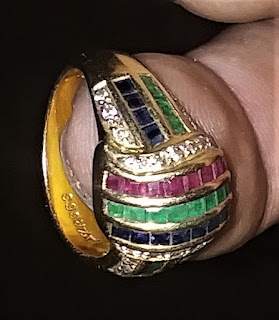Written by the TreasureGuide for the exclusive use of the Treasure Beaches Report.
 |
| John Brooks Beach Saturday Afternoon. |
 |
| John Brooks Beach Saturday Afternoon. |
 |
| Gold Ring With Colored Gem Stones. |
Yesterday I got back on the topic of beach erosion, which I haven't been talking about much lately, but I did do a post on predicting beach erosion on 9/17/22. I did that post after seeing where one group was discussing if it was possible to predict beach erosion. I said yes, beach erosion could be predicted, but not perfectly.
Predicting, even if you can't do it one hundred percent of the time, is still helpful. The hurricane predictions we all watch are a good example of imperfect predictions that are helpful even though they aren't perfect. It is a matter of probabilities. You can put your shutters up when it looks like there is a good chance you will get hit, and you don't have to be on high alert all the time. That is very helpful. Predicting beach erosion is similarly helpful, even if not done perfectly.
So why can't you predict erosion perfectly? There are a number of reasons. First, erosion is like most things in life - there are multiple factors involved. And beach erosion isn't easily defined or simply quantified. To predict anything, you first need to be able to define and measure the thing predicted. How else would you know if you were right or not.
Every time I talk about metal detecting in a serious way, I notice how the same principles apply to life more generally. The same basic principles apply to predicting hurricanes, erosion, diseases, etc.
You can't predict something well that you can't define precisely or measure well. Defining and measuring are highly related. (See Percy Bridgeman on operational definitions.)
So what are some of the difficulties involved with predicting erosion.? First, it is not a simple thing to measure. It varies in so many ways. If you go to the beach and see a big cut, maybe six to eight feet tall, you'd have good agreement that there has been some erosion, but if you don't see a cut, there can still be a lot of erosion. It just isn't as obvious. Erosion, can be big or small, be at different positions of the beach, be on some beaches and not others, or parts of some beaches and not others, be productive or not, and be in either new renourishment sand or old deeper layers. There are a lot of variables that prevent a simple answer to the question of whether or not you'd say a beach is eroded or not, and if it is, how much is it eroded. And that is not even the most important question. It is helpful to know if a beach is eroding, but what detectorists really want to know is if the beach is producing, which is not quite the same question.
As I already suggested, not all erosion is productive. Those are correlated, but not perfectly, which is why I have a beach conditions rating scale rather than erosion rating scale. What appears to be a lot of erosion, might not be productive, and that can be for a variety of reasons.
Ok. So first of all, erosion is not easy to quantify. It is certainly not a binary thing. You cannot simply say without qualification that the beach is either eroded or not. It can be eroded to different degrees, in different ways and productivity. That means the answer will be imprecise. I used a five-point scale for beach conditions, which attempts to be a little more precise than using a two-point scale but is still a generalization.
The secondly, the variables used to predict erosion are not 100 percent accurate. Things such as the surf predictions and wind predictions, which might be used to predict erosion, are predictions too, and are not always correct. So if you use predictors that are not always accurate, your predictions will not be 100% accurate either.
I don't think I need go on. Basically, what I am saying that we can predict erosion to some extent, and that is helpful, yet there are reasons that it can't be predicted with 100% accuracy. The first obstacle being the difficulty of measuring and quantifying it, and the second being the nature of the factors used to make the predictions.
I am pleased with my continuing ability to predict both erosion and describe beach conditions but am still studying and improving.
---
 |
| Source: MagicSeaWeed.com. |
Looks like we'll have a little higher surf tomorrow.
Good hunting,
TreasureGuide@comcast.net